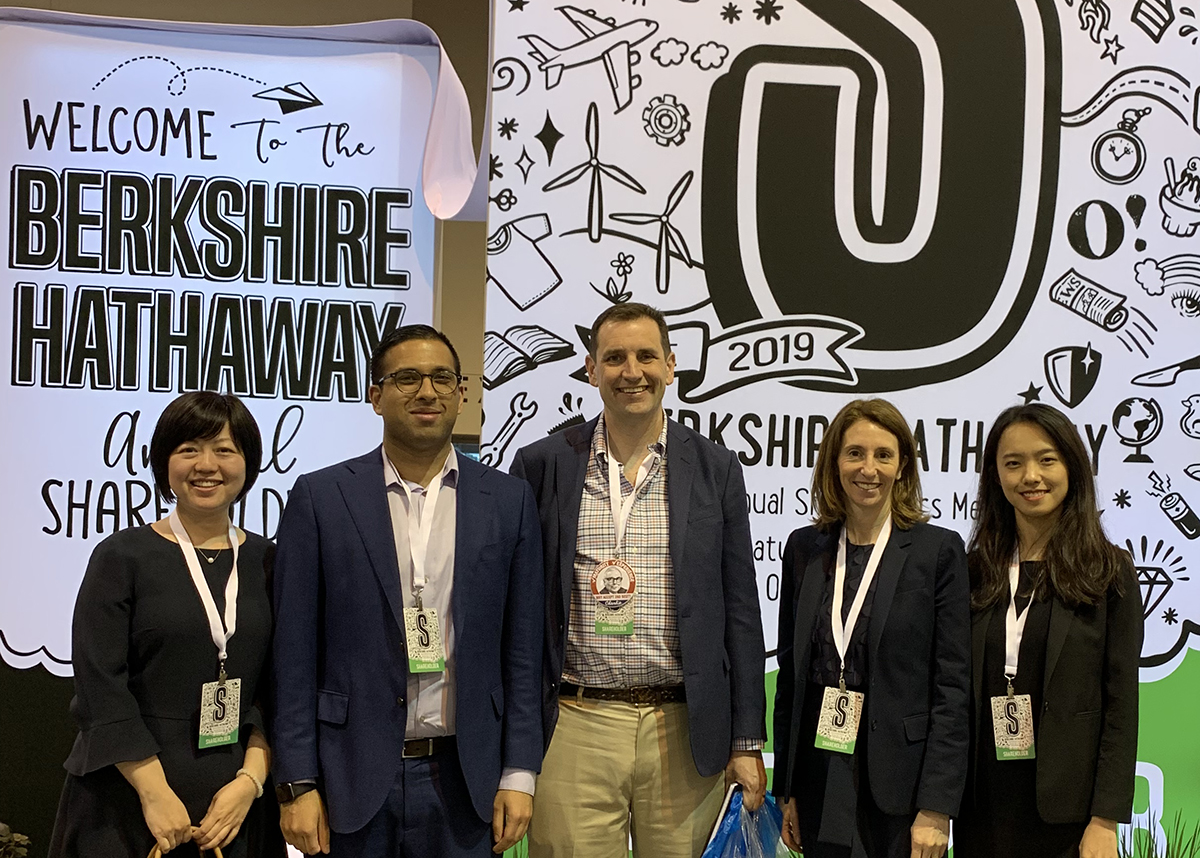Why Pender?
Rite of Passage – Berkshire Hathaway AGM and Markel Corporation AGM, May 2019

“The best thing a human being can do is to help another human being know more.” – Charlie Munger, Berkshire Hathaway
On May 4, 2019, members of the Pender Investment Team joined the thousands of others descending on Omaha, Nebraska for the Annual Berkshire Hathaway Shareholder Meeting in what has become a rite of passage for anyone who is a student of the investing principles of Warren Buffett and Charlie Munger. The meeting has been attracting investors for years, but this year it drew a record-breaking crowd. The sheer diversity of the attendees was also impressive. No other event in the world could draw everyone from an 11-year-old newly minted investor to the owners of the plethora of private jets which packed local airports.
For some on the Pender team, this was a first-time experience and the wisdom of Warren and the quick wit of Charlie were not lost on newcomers. For those of us returning, the appeal of the event is not only the opportunity to reaffirm our views on Berkshire’s patient, prudent and opportunistic approach to value investing, but, also the experience of meeting and sharing ideas, insights (and cocktails) with the global diaspora of investors who make this pilgrimage each year. What is also striking is the simplicity of the conference, which is in stark contrast to the success of Berkshire Hathaway. In the small, windy town of Omaha, we received a warm welcome from locals, met old friends, made new ones and took away many words of wisdom from our hosts.
Berkshire Hathaway: Compounding with Quality
“You can turn any investment into a bad deal by paying too much. What you can’t do is turn something into a good deal by paying little.” – Warren Buffett
At the Berkshire AGM, there were numerous questions about the underperformance of Kraft Heinz. Attendees asked: if consumer brand value was eroding, did the company overpay for Kraft and whether the significant cost cutting undertaken at the company was done at the expense of growth. Buffett acknowledged that “people can pay too much for a wonderful business” and that they had likely overpaid for Kraft.
This message was not lost on us. It ties in closely with the risk assessment process we use at Pender, whereby we evaluate prospective investments on the basis of the Trinity of Risk: balance sheet risk, business risk and valuation risk. Valuation risk refers to the possibility of miscalculating the intrinsic value of a company and, as a result, overpaying for the stock. Growth should not be used to justify overvaluation after you take opportunity costs into consideration. Applying this lesson to our investment process means that when we find good businesses with the potential to compound returns, it is important to be patient and to wait for a potential “fat pitch” to present itself during the market’s episodic dislocations and thus to limit the risk of overpaying.
Berkshire Hathaway: Moats in Disruption
Technology-driven disruption is a key area of discussion for us at Pender. We are continually challenging the investment theses of the businesses we own, evaluating whether a perceived economic moat is at risk of weakening and trying to identify companies with sustainable moats that can disrupt an industry. This theme was brought up at the meeting in terms of the shift in power within retail from consumer goods companies to the retailers themselves. Within the consumer space, Amazon is not only taking share from traditional retailers, but it is also using its promoted search functions and rating-based algorithms to promote Amazon private-label products, weakening the moat of traditional consumer brands. Berkshire is experiencing this firsthand with Duracell, which they bought for $4.7 billion in 2015 based on the perceived durability of the brand. But Amazon has recently outpaced Duracell in battery sales, illustrating a shift in consumer preference for convenience and price over historical factors like perceived quality and brand value. In this age of disruption, with shifting business models, Munger advised investors that they should be a master within their circle of competence but should also try to expand it…if they can.
Markel Corp: Business Resilience and Capital Allocation
“Money makes money. And the money that money makes, makes money” – Benjamin Franklin.
On May 5, 2019, we also attended the investor meeting held by Markel, a successful insurance firm that has espoused many of the sound business principles found at Berkshire Hathaway. We were reminded of the power of compounding and the importance of both business resilience and capital allocation. Business resiliency is based on operating in a way which results in customers and clients wanting you to be in business in the future and who would miss the company if it no longer existed. Managers of these kinds of companies tend to have a long-term view, while also focusing on day to day operations – can we open for business tomorrow? Tom Gayner (CEO) articulated this in his Letter to Shareholders, “We have a dual time horizon of Forever and Right Now.” Executives at these companies are constantly asking themselves: is the company doing the right things for their customers; how can the company improve; how can we serve customers in a “better, faster and cheaper way,” especially in the age of disruption? They understand that if a company takes care of its customers, everything else will take care of itself and the business will be more resilient.
Business resilience is critical but equally important is capital allocation. How a CEO invests capital can have a dramatic impact on long-term shareholder returns. Essentially capital allocation is investing and CEOs have various “tools” for deploying capital: 1) invest in organic growth, 2) acquire other businesses (either in whole or in part), 3) pay down debt, 4) buy back stock or 5) pay dividends. At Pender, we value CEOs who use their “tool kit” opportunistically, for example buying back stock ONLY when it is trading well below its intrinsic value.
Combining business resilience and good capital allocation is a great starting point for identifying what we call compounders. We view an investment as having an ownership interest in a business; we want to be long term business partners, ideally forever.
Final Thoughts
“In my whole life, I have known no wise people (over a broad subject matter area) who didn’t read all the time – none, zero.” – Charlie Munger
With renewed inspiration, we leave the quiet town behind us, but what have we learned? What can we bring back (apart from See’s Candy) that will enrich the others on our team? What have Warren and Charlie imparted to us? One consistent theme they have repeated numerous times is the importance of reading, reading and more reading. As Charlie Munger has said in the past, “My children laugh at me. They think I’m a book with a couple of legs sticking out”.
As we reminisce on our whirlwind weekend, we can’t help but be struck by their strength of character. This was truly an experience of a lifetime and we can’t wait to make the journey again…
By Members of the Pender Investment Team,
May 10, 2019

Circle of Competence
Warren Buffett and Charlie Munger said it best when they recommended that investors stay within their “Circle of Competence”. Your circle of competence is the knowledge base you have developed, over and above the average […]

The Tide Goes Out Investing
In extraordinary times, when markets are stressed the broad opportunity set widens. But from a psychological perspective, it sure doesn’t feel like an opportunity.“The tide goes out” in periods like the financial crisis of 2008-2009 […]

Needle in the Haystack Investing
In normal times, when markets are relatively tranquil the opportunity set is narrow. Armies of smart analysts and investors do their research and stocks are priced much more efficiently than less followed stocks. It’s challenging […]



